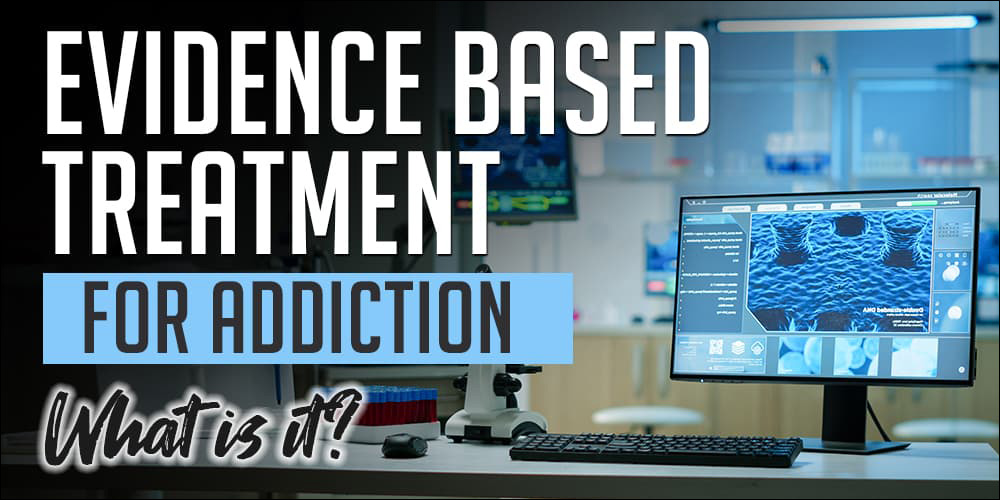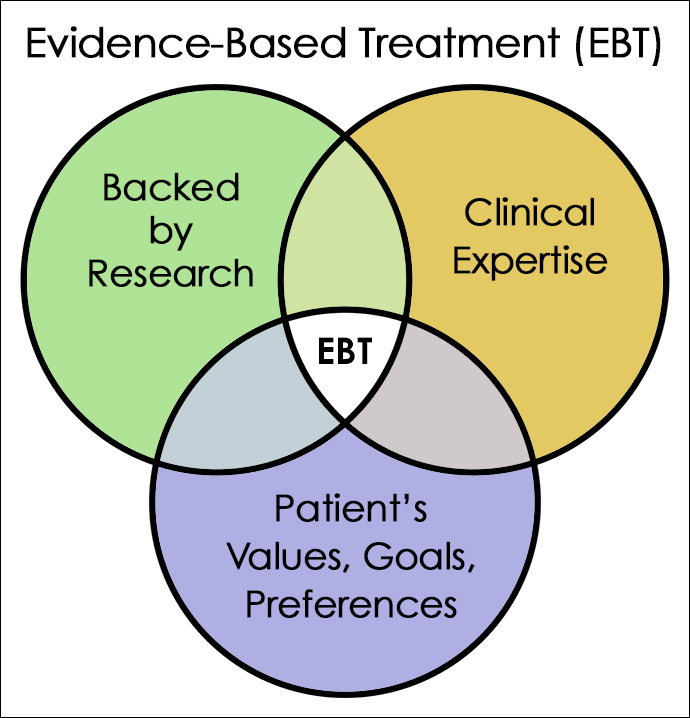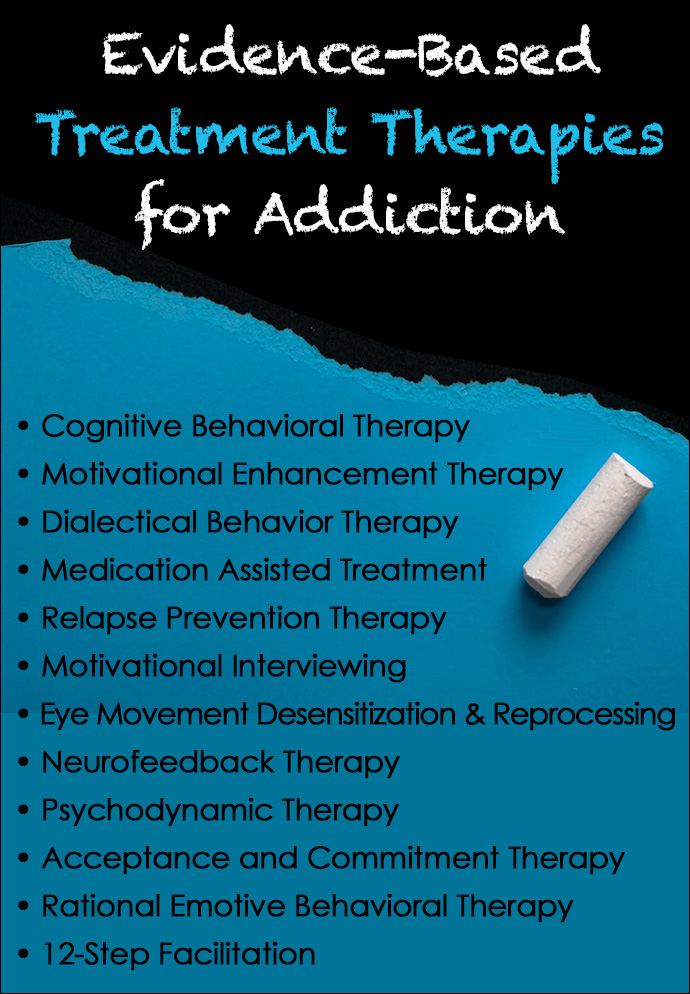
For anyone seeking treatment for addiction and mental health issues, it can be difficult and confusing to understand some of the terminologies. One of the most frequently used terms is “Evidence-Based Treatment for Addiction,” but what does that really mean?
What is Evidence Based Treatment?
Evidence-Based Treatment (EBT), is based on the principles of evidence-based medicine (EBM) or evidence-based practice (EBP), that utilize the best methods of patient care according to evidence.
Treatment therapies that have shown to be effective through testing methods and scientific studies are considered to be evidence-based.
This means that evidence-based treatment therapies aren’t just theories but are actually backed by science and evidence that shows they are effective.
There are two primary goals of evidence-based treatment:
1. Improve the quality of treatment
2. Increase accountability
For the patient-client, this means he or she can be confident that evidence-based treatment therapies have been researched and proven to be effective for helping people with similar issues.
They can also take comfort in knowing that evidence-based therapies consider the individual preferences, actions, clinical state, and circumstances for each person being treated.
This is especially important for treating addiction and mental health disorders because the patient’s belief in the effectiveness of the treatment will play a significant role in a successful and lasting recovery.
Doctors, therapists, and treatment providers are continually exploring new ways to connect with their clients to promote healing and enhance their life during, and after treatment.
Evidence-based medicine and the scientific method that bolsters it is a way to continually test and modify treatment methods for maximum effectiveness, allowing these therapies to get better over time.
Dr. David Sackett first proposed the idea of evidence-based practice in 1996 as it pertains to medicine, dentistry, nursing, physical therapy, and other fields.
There are generally six steps of evidence-based practice:
1. Ask a clinical question
2. Search the published literature
3. Appraise the articles
4. Integrate the findings into your practice
5. Evaluate the results
6. Share your findings
Levels of Evidence
In addition to the steps above, studies are often graded on the levels of evidence based on the quality and validity of the method used to evaluate them, and also how well they apply to patient care.
Level I – Evidence from a systematic review of all relevant randomized controlled trials (RCTs), or evidence-based clinical practice guidelines based on systematic reviews of RCTs
Level II – Evidence obtained from at least one well-designed Randomized Controlled Trial (RCT)
Level III – Evidence obtained from well-designed controlled trials without randomization
Level IV – Evidence from well-designed case-control and cohort studies
Level V – Evidence from systematic reviews of descriptive and qualitative studies
Level VI – Evidence from a single descriptive or qualitative study
Level VII – Evidence from the opinion of authorities and/or reports of expert committees

Benefits of Evidence-Based Treatment
When it comes to healing addiction and mental health conditions, it’s important for the patient to know the treatment therapies will be effective.
Evidence-based treatment has shown to be more effective than programs not based on research and evidence, and it offers increased quality and accountability.
Benefits of Evidence-Based Treatment for Addiction Include:
1. Backed by Research
Evidence-based treatment therapies are backed by research and data that shows they are effective, as opposed to therapies that are assumed to be adequate.
2. Clinical Expertise
Treatment is provided by doctors and therapists who are trained in the therapies offered and specialize in the conditions being treated.
3. Individualized for the Patient’s Values, Goals, and Preferences
Evidence-based treatment is tailored to each person’s specific needs, values, goals, and preferences. This makes it a collaborative and empowering process for both the patient and therapist who work together to achieve the patient’s recovery goals.
4. Safe and Ethical
EBT provides safe and ethical care based on evidence, instead of subjective experience or bias. This ensures the treatment will offer the highest quality of care for the patient.
5. Improved Quality of Life
Evidence-based treatment has shown to improve patient quality of life and outcomes for those who receive it, compared to other forms of therapy. This will result in positive short-term and long-term results.
6. Cost Effective
Evidence-based therapy is often time-limited and more effective than other forms of treatment, which means time spent in therapy is more productive and successful in a shorter time frame.
7. Mental Health and Addiction
Treatment therapies that are backed by evidence are often well suited for treating both mental health and addiction issues. Because both conditions regularly co-exist together, treating both at the same time will offer a better chance for a successful recovery.
Types of Evidence-Based Treatment Therapies
There are many evidence-based treatment therapies that have proven to be effective for treating mental health issues and substance use addiction.
In addition, new therapies are emerging or being reviewed every year to benefit both the therapists and patients.

Effective Evidence Based Treatment Therapies for Addiction
- Cognitive Behavioral Therapy (CBT)
- Motivational Enhancement Therapy (MET)
- Dialectical Behavior Therapy (DBT)
- Eye Movement Desensitization and Reprocessing (EMDR)
- Medication Assisted Treatment
- Relapse Prevention Therapy (RPT)
- Motivational Therapy and Motivational Interviewing
- Neurofeedback Therapy
- Psychodynamic Therapy
- Acceptance and Commitment Therapy (ACT)
- Rational Emotive Behavioral Therapy (REBT)
- 12-Step Facilitation
Importance of Evidence-Based Treatment for Addiction
Addiction recovery can be a complicated journey that may involve many roadblocks and setbacks.
With so many types of recovery programs available, it can be difficult finding one that will be a good fit.
Sometimes the type or severity of addiction will narrow the choices between an inpatient or outpatient program, as well as 12-step versus non 12-step rehab treatment.
Some people are only struggling with substance use addiction, while others have a co-occurring disorder of addiction combined with a mental health condition like depression or bipolar disorder.
Co-occurring disorders can be more complex and require dual diagnosis treatment that addresses both conditions at the same time.
When considering the various options, understanding the importance of evidence-based treatment for addiction can make it easier to choose the best program for long-term recovery.
Recovery facilities that incorporate evidence-based treatment offer cutting-edge, proven therapies that have shown to improve the health and well-being of those struggling with addiction.
While not every form of therapy used in addiction recovery is proven to work for each individual, facilities that offer evidence-based treatment are widely recognized as some of the best in the field.
Using scientifically-proven therapies gives patients the best chance at achieving long-term recovery and improving their overall quality of life.
EBT can be used in individual, group, and family therapy sessions to not only identify the root causes of addiction and mental health issues, but also to teach techniques that can be used to avoid relapse and ensure a lasting sobriety.
By utilizing evidence-based treatment, addiction recovery facilities offer top-of-the-line clinical care that is safe, effective, and tailored to each patient’s needs that will improve life after rehab.
Related Posts
- 8 Famous People Who Kicked Their Cocaine Addiction
People are often influenced by the rich and famous, and sadly that can mean normalizing…
- 12 Ways to Improve Life After Rehab for Addiction
Most people agree that completing an addiction treatment program can be difficult, but it is…
- Alcohol Dementia Causes, Symptoms and Treatment
Note: Alcohol Dementia goes by many names including, alcohol-related dementia, alcoholic dementia, and alcohol-induced dementia.…
